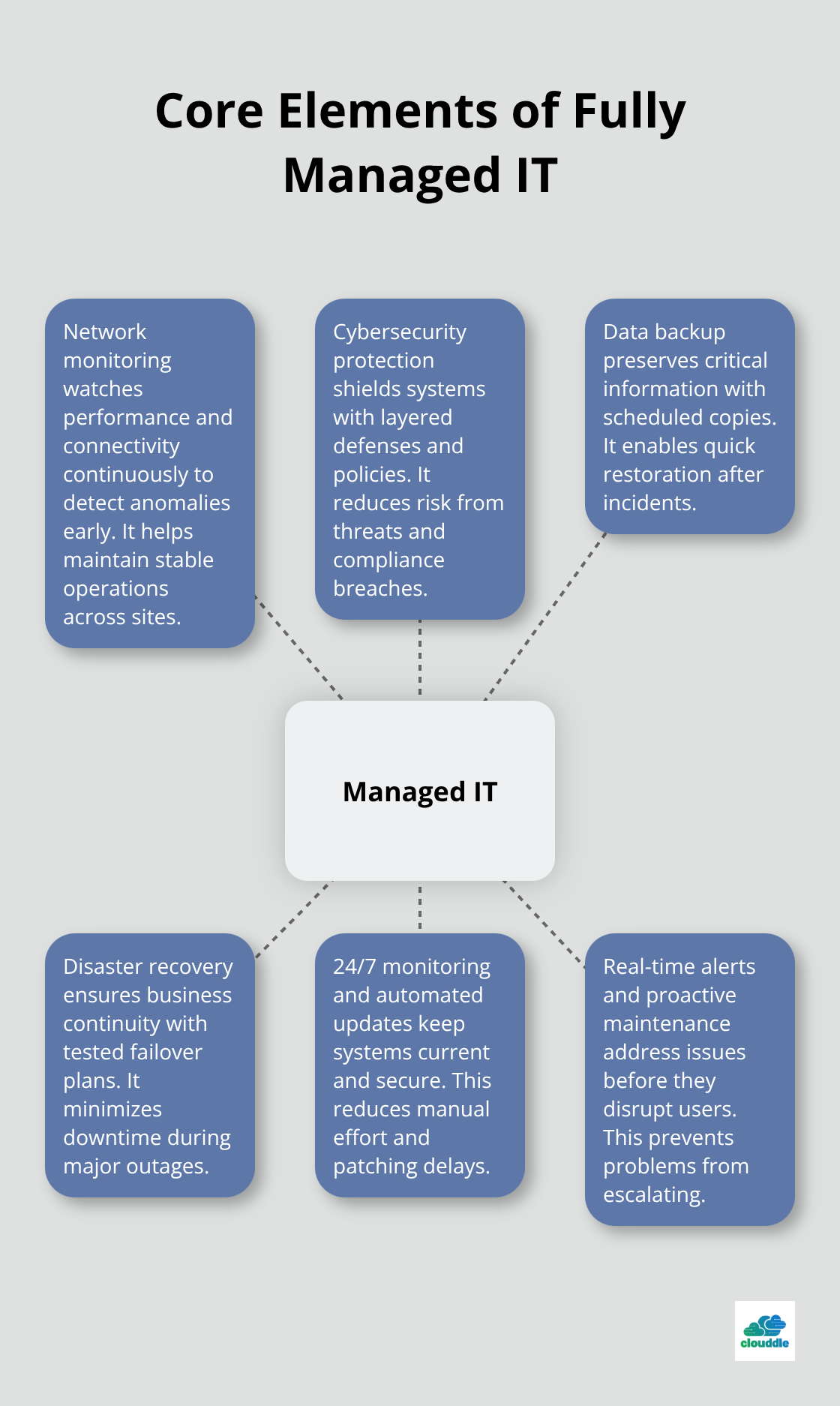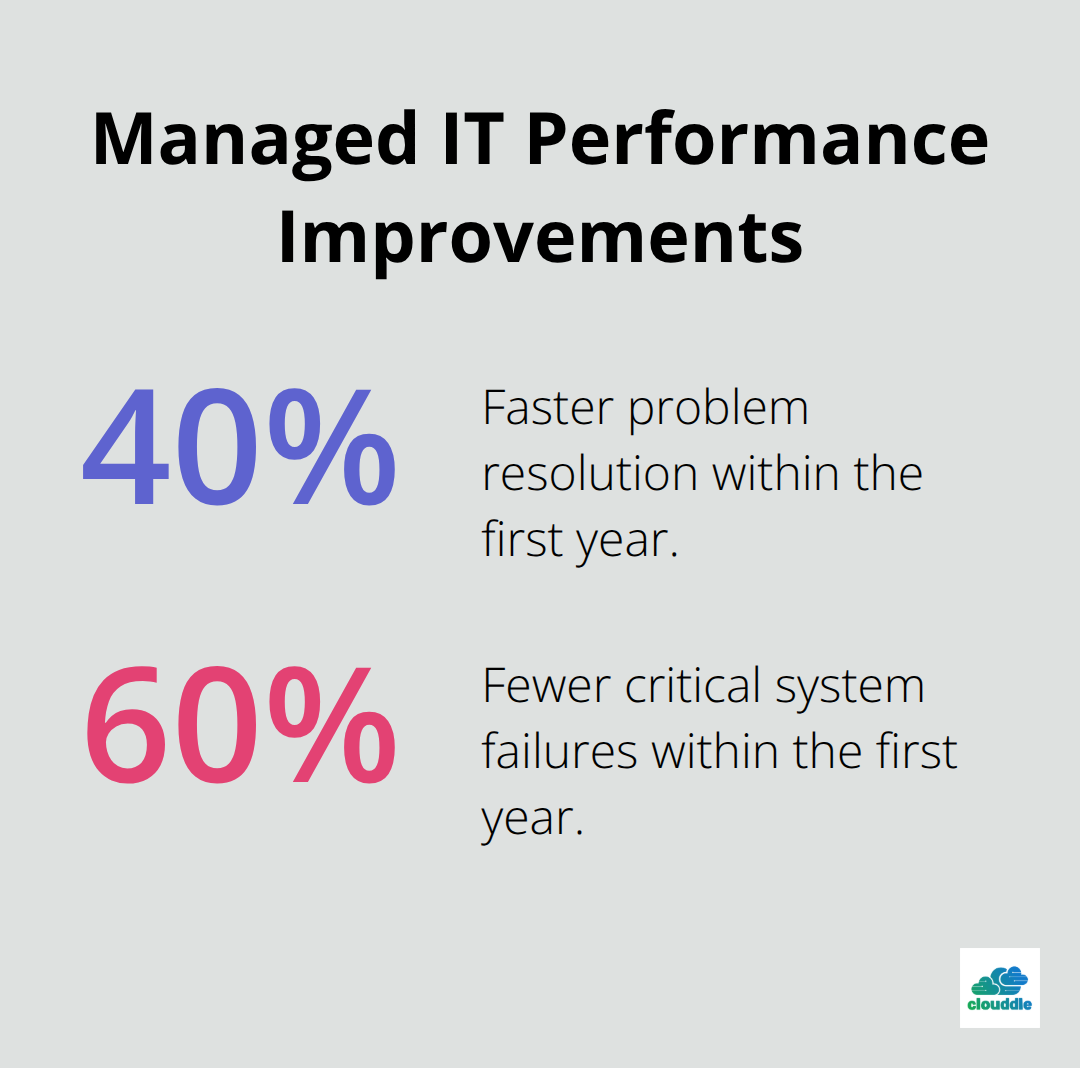Choosing the right fully managed IT solutions can transform your business operations and reduce overhead costs significantly. Most companies waste 23% of their IT budget on inefficient support models.
At Clouddle, we’ve seen businesses cut their IT expenses by up to 40% while improving system reliability. The key lies in selecting a provider that aligns with your specific needs and growth plans.
What Makes Fully Managed IT Different
Fully managed IT services handle your entire technology infrastructure from network monitoring to cybersecurity protection, data backup, and disaster recovery. These comprehensive packages include 24/7 remote monitoring, automated updates, real-time alerts for potential issues, and proactive maintenance that prevents problems before they occur.

Most providers offer flat-rate monthly pricing between $125-$175 per user or $35-$250 per device (giving you predictable costs and access to enterprise-grade capabilities without hiring full internal teams).
The End of Reactive Support Models
Traditional break-fix IT support waits for problems to happen, then charges you to fix them. This reactive approach costs businesses significantly more than proactive management. Small businesses without managed IT services face various operational challenges that can impact their technology infrastructure and overall productivity. Managed services flip this model completely-they monitor your systems continuously, identify issues early, and resolve them before they impact operations.
Industries That See the Biggest Returns
Healthcare practices benefit most from managed IT due to strict HIPAA compliance requirements and the need for secure patient data handling. Financial services companies follow closely, requiring robust cybersecurity measures and regulatory compliance support. Multi-family dwelling properties and senior living facilities also see substantial returns from managed services (as these industries need reliable connectivity for residents while maintaining operational efficiency). Manufacturing companies with multiple locations rely heavily on managed IT to maintain consistent network performance across facilities.
What Should You Look for in a Provider
The most important factor when you select a managed IT provider is their ability to respond within your business-critical timeframes. Look for providers who guarantee response times of 15 minutes or less for critical issues and 4 hours maximum for standard problems. These Service Level Agreements should include specific penalties if response times are missed.
Certification Requirements That Matter
Microsoft-certified partners typically offer better integration with existing business systems, while Cisco certifications indicate strong networking expertise. Providers without these certifications often struggle with complex enterprise environments and may cause more problems than they solve. These industry certifications demonstrate the provider’s technical competence and ability to handle enterprise-level challenges effectively.
Response Time Standards That Actually Work
Your SLA should specify different response categories with clear definitions. Priority 1 issues that affect business operations need immediate response, while Priority 2 issues can wait up to 2 hours. The best providers offer robust Service Level Agreements with uptime guarantees and financial penalties when they miss targets (which shows they stand behind their commitments).
Ask potential providers about their average resolution times, not just response times. Many companies promise quick responses but take days to actually fix problems. This distinction separates reliable providers from those who simply acknowledge issues without solving them promptly.
Flexibility and Growth Accommodation
Scalability becomes essential as your business grows – your provider should handle sudden increases in users or locations without new contracts or significant price changes. The most flexible providers offer month-to-month terms after an initial commitment period (which allows you to adjust services based on changing needs).
Your chosen provider should adapt their service offerings as your technology requirements evolve, which leads directly to understanding how different pricing models affect your long-term costs and return on investment.
What Will Managed IT Really Cost You
Managed IT pricing structures vary dramatically between providers, but the most transparent ones use flat-rate monthly models that range from $125-$175 per user or $35-$250 per device. Value-based pricing aligns costs with business outcomes and typically delivers better results than simple per-device models. Watch out for hidden costs like onboarding fees, which can add $2,000-$5,000 to your first year, and out-of-scope charges for services that should be included.
The worst providers bury these fees in complex contracts, while quality MSPs provide clear pricing breakdowns upfront. Most companies discover additional charges only after they sign contracts and begin implementation.
The True Cost of Internal IT Teams
Internal IT professionals cost ,000-,000 annually plus benefits, equipment, and training expenses that push total costs above 0,000 per employee. Most small businesses need at least two IT staff members to provide adequate coverage, which makes internal teams cost $200,000+ yearly.
Companies that work with MSPs reduce their annual IT costs by 25%+ according to industry studies, while they gain access to specialized expertise that would cost hundreds of thousands to hire internally. The average MSP client saves $80,000 annually compared to maintaining equivalent internal capabilities.
System Downtime Impact on Revenue
System downtime costs small businesses $8,600 per hour on average, while companies with managed IT experience better uptime through 24/7 monitoring and support that spots potential problems before they impact operations. This improved availability translates to additional days of productivity annually.
Businesses that use managed services report 40% faster problem resolution and 60% fewer critical system failures within their first year. These improvements directly impact your bottom line through reduced lost productivity and fewer emergency repair costs.

How to Track Your Return on Investment
Track your productivity gains by measuring help desk ticket volume, system availability, and employee satisfaction scores before and after implementation. Document the time your staff spends on IT issues versus core business activities (as this shift often provides the clearest ROI indicator).
Calculate your total cost of ownership by including all internal IT expenses, from salaries to software licenses to emergency repairs. Compare this baseline against your MSP costs plus any remaining internal IT expenses to determine your actual savings and improved operational efficiency.
Final Thoughts
You need to evaluate provider expertise, response times, and pricing transparency when you select fully managed IT solutions. Focus on MSPs with Microsoft and Cisco certifications who guarantee 15-minute response times for critical issues. Choose providers who offer clear flat-rate pricing without hidden onboarding fees.
Document your current IT expenses and productivity metrics to establish baseline measurements before you start implementation. Request detailed proposals from three qualified providers and compare their SLAs, uptime guarantees, and penalty structures for missed targets. This comparison process helps you identify which provider offers the best value for your specific requirements.
The right partnership requires providers who adapt their services as your business grows. Quality MSPs offer flexible month-to-month terms after initial commitments and scale their support without new contracts or significant price increases. We at Clouddle specialize in fully managed IT solutions for hospitality, multi-family dwelling, and senior living industries (with 24/7 customer service and flexible contracts that grow with your business needs).


